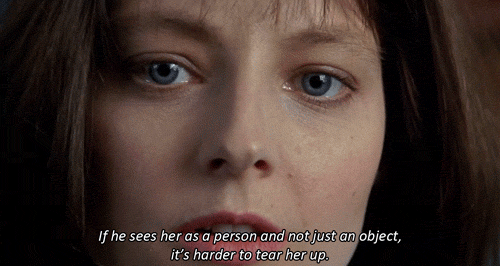Sexy Lamp Communication
People...I like to feel interesting. I think we all do. We like to feel like the people we engage with are genuinely invested in our lives, our opinions and our experiences. But I’ve noticed a growing trend among many men to treat the women in their lives as sexy lamps. No, I don’t mean they only turn them on when they need to brighten their day. I mean, they treat them like an alluring, but otherwise inanimate object.
Perhaps you’ve heard about the Bechdel-Wallace test. Created in 1985, this test asks if your movie has more than two female characters, whether those characters have names, and whether they talk to each other about something other than a man. Seems like a pretty low bar, right? Well it’s a source of constant disappointment how many films fail it. But today, we’re going to set the bar even lower and look at the Sexy Lamp test.
The Sexy Lamp test asks if you can replace your female character with a sexy lamp and have the story remain unchanged. Sometimes, if you’re really ambitious you can replace her with a sexy lamp and a post-it note, for those occasions where your female character exists solely to pass on a small amount of exposition. Now this concept might seem a little abstract, and you might be struggling to understand what it looks like in practice. If you need help, I recommend having a quick read of our Feminist Fairy Tale.
Thanks to science we now have quantifiable evidence that a large number of movies suffer from Sexy Lamp Syndrome. Not only that, but research by USC Viterbi School of Engineering’s Signal Analysis and Interpretation Lab (SAIL), found that women’s roles were more often focused on issues using “language connecting with family values”, whereas men’s focused on “sex and death”.
So why do we have this representation of women on screen? Why are we depicting them as more or less useless individuals who contribute little or nothing to the story and have no autonomy? Perhaps it’s because this is how men tend to treat women in real life. A lot of men tend to converse with women as though they’re sexy lamps.
Think about a conversation you had with someone in your life recently, doesn’t matter whether it’s a family member, or someone you’re dating, or a friend. Think about the topics of conversation. Did they ask you about any of the following?
Your life (Hey, how did your mum’s birthday party go?)
Your interests or pursuits (How was that sports game last weekend?)
Your career (What was that presentation you did about?)
Physical or mental health (How is your new therapist going?)
Relationship or family? (I heard you’re dating someone new, tell me all about them!)
And now ask if they actively listened to your answers. Did they ask follow up questions and empathise with the things you said?
All of these interactions show investment in you as a person outside of your interactions with them. They are acknowledging that you exist when you’re not around them and they want to know what that looks like.
Sexy Lamp Communicators though tend to ask “how are you” and forget to ask follow up questions. When you tell them how you are, it's as though you didn't say anything at all, because this person doesn't actually engage with what you've said. If you explain a problem you're having you'll get something like "Oh, I'm sure you'll sort it out". If you say you're feeling down, you'll get an "Oh that's no good" followed by a subject change. If you say you're struggling at work you might get an "Ah, that's a bummer" before they start talking about their work.
Whether consciously or not Sexy Lamp Communicators see the people they talk to as being there purely to look pretty and light up the room. It doesn’t occur to them to ask follow up questions or engage with what you're saying, because the value they’re placing on you doesn’t include your thoughts or opinions.
Now, I say that this predominantly applies to men’s treatment of women. So before we get the requisite #notallmen, I should point out that of course this doesn’t apply to all men, and of course it absolutely applies to women as well. However, as with rape, domestic violence and sexual assault, it’s more commonly an issue perpetrated by men against women.
Partially this is because as a society we place different expectations on men’s standards for social engagement. Women are expected to be empathetic and compassionate listeners, and female friendships are built largely around good quality conversation. Men are socialised to believe that feelings and emotions aren’t masculine. And that being masculine is very much the thing they should want to be.
Sexy Lamp Communication is more than simply a gendered conversation style though, it’s a socially reinforced way of treating women. Through media and existing social behaviour we’re constantly reiterating that women’s words don’t matter. We make jokes about women who nag men, about how they’re always on the phone, always nattering away mindlessly. We grow up absorbing these jokes and references and internalise the idea that women very rarely have valuable contributions to make.
We think of women as being “hysterical” and overreacting to situations. We think of them as creatures ruled by their hormones and emotions. This is something that has been confirmed by trans individuals. A transgender man said of his experience:
“People actually listen to what I say and pay attention,” he said. “I feel like I'm getting taken more seriously.”
There are countless studies showing that women are consistently interrupted more than men and that men talk more, and often over the top of women. In a now-classic study, Barbara and Gene Eakins recorded seven university faculty meetings. They found that men spoke more often and, without exception, spoke longer. The longest comment by a woman at all seven gatherings was shorter than the shortest comment by a man. And with most of these studies the perception is still that women are doing most of the talking or that it’s about equal. Because we have internalised the idea of women being nattering airheads so much that we don’t even notice that it’s not true.
Rather than acknowledge that they’re treating women like Sexy Lamps though, many men simply tell women it’s their own fault and that they need to speak up more and be more assertive. Aside from being a dick move and victim blamey as hell, there’s also a long list of studies that prove this either doesn’t work or actively hurts people’s perceptions of women.
The author of that last study asked professional men and women to evaluate the competence of chief executives who voiced their opinions more or less frequently. Male executives who spoke more than their peers were rewarded with 10 percent higher ratings of competence. When female executives spoke more than their peers, both men and women punished them with 14 percent lower ratings. Because Sexy Lamps aren’t meant to talk.
There’s a good chance that if you identify as a man, you’re sitting there thinking “Well I certainly don’t see women that way. I would never treat them differently”. The thing is though, this isn’t a conscious decision you get to make. You’re not sitting there telling yourself that “women’s opinions are pointless”. The same way none of us overtly think that “nursing is a job for women, and construction work is a job for men”. We don’t deliberately opt in to these beliefs, they’re just subtly there, informing our actions and decisions. You’re not deciding to be a Sexy Lamp Communicator, you’ve just never learned how not to be. Many men will point out that they listen to men and women the same way. But it doesn’t matter if you’re treating the men in your life like Sexy Lamps, because men still have the privilege of not being perceived as one. Even if you're not actively listening or engaging with the men in your life, it's not damaging their career, or people's perceptions of them. Men can talk in meetings and interrupt and talk more often and not have it damage the way people see them.
Women notice that they’re being treated like Sexy Lamps, but without the ability to take action against the system there isn’t a lot they can do. So, often, they’ll just stop talking. Two women in the writer’s room of The Shield did this and it was only chance that the head writer noticed and asked why they weren’t contributing. They told him to observe what happened when they did, at which point he realised neither of them could speak without interruption, and that often their idea was taken by a man, expanded upon and claimed as his own. Fortunately the head writer implemented a “no interruption” rule in his writer’s room. But how many more women are living in spaces where there is no benevolent manager to step in and assist? So women learn not to speak up. Deborah Tannen, a gender and language expert observes:
One reason women tend to speak less at meetings, in my view, is that they don’t want to come across as talking too much. It’s a verbal analogue to taking up physical space. When choosing a seat at a theater or on a plane, most of us will take a seat next to a woman, if we can, because we know from experience that women are more likely to draw their legs and arms in, less likely to claim the arm rest or splay out their legs, so their elbows and knees invade a neighbor’s space. For similar reasons, when they talk in a formal setting, many women try to take up less verbal space by being more succinct, speaking in a lower voice and speaking in a more tentative way.
Many women have learned not to wait for an invitation to share. They say ‘fuck it’ and talk anyway, figuring if they want to be heard they need to initiate the conversation themselves. This is a bold and awesome move, but will often end up with them being labelled all the things we use to put women down; nattering, waffling, chatterbox, nagging, shrill, hysterical, mouthy, etc. We rarely attribute these same descriptions to men. And so we find a way to socially display our disapproval of the verbal space they’re taking up. A way to coerce them into going back to being silent, Sexy Lamps.
Women often internalise the knowledge that men aren’t interested in the things they have to say, sometimes without being conscious of doing so. This results in many women changing their behaviour so that they don’t talk about everyday issues and events with the men in their lives. Because they’ve learned that this is what female friendships are for, but that men won’t give them an empathetic or validating response. This is probably a contributing factor in why so many men are surprised to learn that the women in their lives experience harassment, assault, and sexual violence. When men treat women like Sexy Lamps, they’re sending the message that their stories and experiences don’t matter, because they’re never engaging with anything deeper than surface level conversation. So women learn to self-censor.
In day to day interactions between men and women this often means that men perceive women to have a hair trigger response to seemingly small issues. This results in men creating a narrative that women are “emotional”, “indecipherable” and “mysterious” and making jokes about “having your period”, because to them there’s no context for the frustration or emotional responses women have. For women though there has likely been a build up to this moment that involved a number of conversations that went unheard.
Whether it’s public, professional or personal relationships women learn over a lifetime of communication that a lot of the time men are going to treat them like a Sexy Lamp; asking questions, but never actively listening to the answers. Sexy Lamp Communicators forget that the person in front of them has a life and autonomy and opinions and ideas that carry equal weight to their own, and take any opportunity to turn the conversations back to themselves and their experiences often interrupting and derailing dialogues to ensure that their ideas are heard.
The catch-cry of most equality movements is about listening to the experiences of people who have less privilege than you. A man treating a woman like a Sexy Lamp is a perfect example of failing at this. If you’re not actively asking the women in your life about their experiences, you’re not encouraging them to share with you or trust you.
Listening to someone talk isn’t about sitting there in silence. You need to make sure that you’re engaging with what they’re saying, validating their experience where necessary, asking follow up questions and making them feel heard. If you’re not doing that, you’re just reading the post-it note on the lamp and waiting for your chance to monologue again.
So if you identify as a man, and you want to develop meaningful and supportive relationships with women, it’s time to take a look at the way you communicate with them. Do you treat them like a Sexy Lamp? Are you making the effort to engage with them in a way that makes them feel interesting and heard? Are you doing it In a way that makes them feel like they’re the protagonist of their own story? Because when the rest of society is talking over the top of you, interrupting you, telling you that you’re too loud and take up too much verbal space, the biggest turn on for any Sexy Lamp is finally being heard.
That’s all.
You may go now.

















